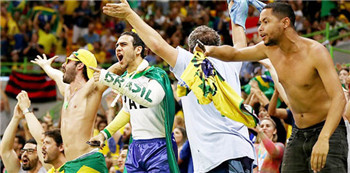(单词翻译:单击)

It was during the men’s 100m final on Aug 14 that US *sprinter Justin Gatlin, after stepping out into the stadium ready to race, was met by a song of cheers which quickly *cascaded into a chorus of *boos.
8月14日奥运会男子百米短跑决赛的赛场上,当美国选手贾斯汀•加特林出场准备比赛时,迎接他的欢呼很快就变成了阵阵嘘声。
The crowds at Rio evidently still haven’t forgiven Gatlin for his historical doping bans, but the US runner hasn’t been the only one subjected to the *wrath of the Brazilian booers at the 2016 Olympics.
显然,里约的观众们还没有原谅加特林曾因兴奋剂遭到禁赛的往事,但在2016年奥运会上遭受巴西观众喝倒彩泄愤的人并不止加特林一人。
Earlier in the month, Egyptian Judoka Islam El Shehaby was also unceremoniously booed for refusing to shake hands with opponent Or Sasson after being defeated by the Israeli.
本月早些时候,埃及柔道运动员埃尔•谢哈比被以色列选奥尔•萨松打败后,不愿意和对方握手。而此举也遭到了一阵粗鲁无礼的嘘声。
It seems that audience members at the 2016 Rio Olympics have been roundly criticized for their over-zealous jeering, which seems to be more commonplace than at previous Games, suggesting that the crowds in Brazil are perhaps a more “sprightly bunch” than in previous years.
2016年里约奥运会的观众似乎因其过于热烈的起哄而饱受批评,但这种起哄在往届奥运会中却显得稀松平常。这也表明了巴西的观众或许比往年更为活跃。
But although booing is not a staple of the Olympic crowd’s etiquette, it is by no means a recent phenomenon.
然而,尽管喝倒彩并不属于奥运会观众的基本礼仪,但它也绝非新生现象。
The first written record of mass *heckling comes from, of course, ancient Greece, according to website The BOO Birds.
据The BOO Birds网站报道,第一条群众喝倒彩起哄的书面记录,毫无疑问,来源于希腊。
It says that during *gladiator fights, booing or cheering literally meant life or death to the *combatants–the crowds would cheer to keep you alive or boo to have you put out of your misery.
据称,在角斗士的对决中,欢呼或者是嘘声对于格斗者而言,的确意味着生与死——人们的欢呼声能让你保持活力,嘘声则将你拉入死亡,永远地结束掉痛苦。
The word “boo” didn’t make its written appearance until the 1800s however, where it was used to describe the sound that cattle make. It wasn’t until later that century that its use to describe the noise our friends in modern day Brazil enjoy making came into existence.
然而,“嘘声”(boo) 一词直到19世纪才在书面语中首次出现,用于形容牛的叫声。在19世纪后期,它才被用来形容如今巴西小伙伴们喜欢发出的嘘声。
Reasons for booing vary a lot throughout Olympic history. Some are merely trivial matters – according to a Time news report, at the 1936 Bavaria Winter Olympics, Italian hockey players “loudly booed *pugnacious US player Gordon Smith”, who accused an Italian player of knocking his glasses off – while others are more political.
在奥运会历史上,喝倒彩有着各种各样的原因。其中一些仅仅是因为琐事——据《泰晤士报》的一篇报道显示,在1936年的巴伐利亚冬季奥运会上,意大利曲棍球队队员们大声地向美国队员戈登•史密斯发出嘘声,只因他指责一位意大利队员将他的眼镜撞掉了——而其他一些原因则更具有政治色彩。
At the 1973 Munich Olympics, the gold and silver medals for the men’s 400m dash were awarded to US runners Vincent Matthews and Wayne Collett – both African-Americans.
在1973年的慕尼黑奥运会上,男子400米跑比赛的金银牌得主分别是美国选手文森特•马修和韦恩•科利特——两人都是非裔美国人。
When the US national *anthem was played during the medal ceremony, they refused to face the flag and stood casually with their hands on their hips, instead of one hand on their chests, as tradition would dictate.
当美国国歌在颁奖典礼上奏响时,他们拒绝面向国旗,并且站姿随意,还将手放在屁股上,而不是依照传统,将一只手放在胸前。
Although their intention was to draw attention to the poor treatment of African-Americans in their country at the time, this backfired and their *unbridled behavior drew loud boos from the crowd. “The IOC called it a ‘disgusting display’ and barred them,” wrote The New York Times.
尽管他们的目的是希望引起人们对于非裔美国人当时所遭受的不公正对待的关注,然而却适得其反,他们这种放肆的行为也引起了观众的一片嘘声。“奥组委称之为‘令人恶心的行为’并禁止他们出赛,”《纽约时报》写道。
Furthermore, during the 1984 Summer Olympics in Los Angeles, Zola Budd, a South African-born British athlete, faced a barrage of boos from the audience of the women’s 3,000m final, after getting tangled up with US runner Mary Decker who then came crashing to the ground.
还有,在1984年洛杉矶夏季奥运会中,生于南非的英国运动员左拉•巴德在女子3000米决赛中和美国选手玛丽•德克尔撞在了一起,德克尔随后摔倒在地。此举也受到了在场观众的一连串嘘声。
But the underlying cause for the booing wasn’t her clumsiness – Budd had only applied for British citizenship earlier that year, since South Africa at the time was banned from participating in the Olympics due to its then-policy of *apartheid.
但嘘声背后的原因并不在于她的笨拙——巴德在那年的早些时候才申请了英国的公民身份,由于当时南非奉行种族隔离政策,南非的体育团体被禁止参加奥运会。
“The switch was hugely controversial during the apartheid-era sporting boycott,” wrote The Guardian.
“在种族隔离时代的赛事抵制中,这样的转变十分具有争议,”英国《卫报》写道。
Despite the fact that booing to express displeasure during the Olympic Games is far from elegant, it seems that it’s been a feature of the games long before Brazil. Just as Time notes, “its presence by now shouldn’t be shocking.”
尽管在奥运会赛场上发出嘘声以表示不满的行为十分不雅,但这似乎早在巴西奥运会之前便已成为奥运会的一大特色。就像美国《时代周刊》指出的那样,“现在它的出现不应使人们感到惊讶。”


